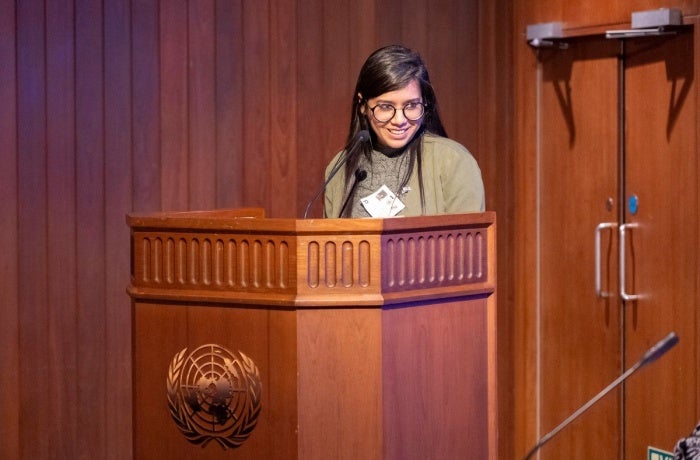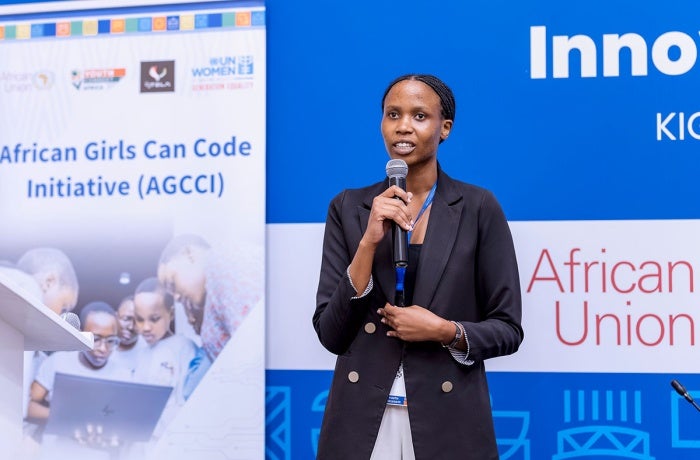‘Refugee women’s voices matter’ – Meet Grace Neima Khemis, the first woman Chairperson of her Refugee Welfare Committee
Nearly half of all refugees are women and girls, yet their voices are often absent from decision-making. A UN Women programme in Uganda trains women refugees to lead. On World Refugee Day (20 June), get inspired by the story of Grace Neima Khemis.
It’s 9 a.m. at the Bidi Bidi refugee settlement in Uganda’s Yumbe District, and Grace Neima Khemis' phone is buzzing every five minutes. Callers are mainly village leaders preparing for a meeting taking place later that day. With enthusiasm, Khemis responds to each call.
Khemis, a 34-year-old South Sudanese refugee, was elected in April 2024 as Chairperson of the Refugee Welfare Committee III, the highest leadership role in the committee for the Bidi Bidi Settlement. She is the first woman to be elected to the position, and it wasn’t an easy journey.

Fleeing war and hunger in South Sudan, Khemis arrived in Uganda with nothing more than the clothes on her back and her five children. She embodies the resilience and determination of refugee women who refuse to be defined by their circumstances.
At first, she felt hopeless. "I lost everything I had worked for," she recalls. Back in South Sudan, Khemis was a bank manager, but when conflict erupted in her hometown, she had to flee, leaving behind a promising career and the comforts of her home.
Arriving in Bidi Bidi, the largest refugee settlement in Africa, life was harsh. Yet she persevered, driven by the desire to rebuild her life and help others do the same. That’s when her leadership journey began.
Building leadership skills for refugee women
In 2019, Grace participated in a series of leadership training organized by the Refugee Law Project, as part of a UN Women programme funded by the Government of Norway. The training helped her learn to articulate issues and advocate for change. Khemis then decided to stand for election for the Chairperson’s role in the Refugee Welfare Committee. “I realized that there were more women refugees than men, but we were not in leadership,” she said. “If a woman can lead, why can't we start from our [settlement] zone? I returned from the training determined to compete for the seat.”
Empowered with newfound confidence, Khemis competed against four male candidates for the Chairperson’s seat. Although she didn't win initially, her determination and hard work earned her an important role representing refugees at the national Refugee Engagement Forum. This platform allowed Khemis to amplify the voices of countless refugees. She advocated with decision-makers to address their needs and priorities, such as access to clean water and healthcare referrals. Her dedication resonated with the community, and in April 2024, she was elected as the Chairperson of the Refugee Welfare Committee – the first woman to hold the position.
When refugee women lead, their communities become:
— UN Women (@UN_Women) June 20, 2024
↗️ More engaged
↗️ More resilient
↗️ More self-reliant
This #WorldRefugeeDay , get inspired by the story of Grace Neima Khemis.
Read the full story 👉 https://t.co/rRMySCZ8Vf pic.twitter.com/rfpPQxcMJI
Majority of refugees in the settlement are women and girls – their voices matter
Khemis understands the unique challenges that refugee women face, having experienced them herself. "Women are the majority," she says, "and a woman leader can empathize with them." Her vision extends beyond her term as the Chairperson – "I want to make sure more women take up leadership roles," she adds.
Khemis knows that boosting refugee women’s leadership cannot be taken for granted. “Even today, there are some women who are afraid to talk in public, some people who think that women are not supposed to talk in public.” In the Bidi Bidi settlement, Khemis says that some roles in education and finance are now reserved for women to encourage their leadership.
Of the 120 million people forced to flee their homes in 2023, 49 per cent were women and girls. In the past year alone, 96,889 refugees arrived in Uganda, increasing the total number of refugees from 1,547,981 to 1,644,870 as of May 2024. Majority of them came from South Sudan and the Democratic Republic of Congo.
“In these protracted crises, it is imperative that services and policies are informed by refugee women's voices and their lived experiences,” says UN Women Country Representative in Uganda, Paulina Chiwangu, adding, “leveraging women’s leadership is not only a way to ensure that humanitarian efforts respond to the gender-specific needs of affected communities, it is also a strategic investment for stronger community engagement, resilience and self-reliance.” In the past five years UN Women’s work has contributed to more women taking on refugee leadership roles in Bidi Bidi and Adjumani settlements, where women’s representation stands at 47 and 54 per cent respectively.
Grace Neima Khemis dreams of a future where refugee girls prioritize education, a path she believes unlocks opportunities and leadership roles. Her message on World Refugee Day is clear: “Refugee women’s voices matter.” She urges world leaders to provide more education, leadership and livelihood opportunities for refugee women and girls and to recognize their resilience.









